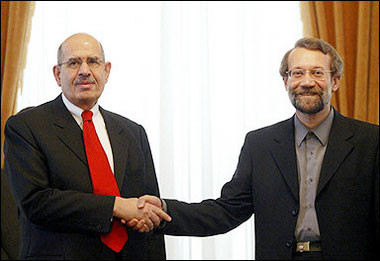TEHRAN - Iran dismissed appeals from UN's atomic watchdog chief Mohamed
ElBaradei to freeze its controversial nuclear program and calm suspicions it is
seeking the bomb.
Speaking after talks with the head of the International Atomic Energy Agency
(IAEA), top nuclear negotiator Ali Larijani brushed off the UN Security
Council's demand for a halt in uranium enrichment by the end of the month as
"not very important".

Head of the UN atomic
watchdog Mohamed ElBaradei(L) shakes hands with Iran's Chief Nuclear
Negotiatior, Ali Larijani, during their meeting in Tehran. Iran's hardline
regime dismissed appeals from ElBaradei to freeze its controversial
nuclear program and calm suspicions it is seeking the bomb.
[AFP] |
"We are cooperating in a constructive
manner... and Mr ElBaradei is here and the inspectors and cameras are here, so
such a proposal is not very important to solve the problem," Larijani told
reporters.
Hardline President Mahmoud Ahmadinejad also vowed there was "no room for
defeat and retreat".
ElBaradei's 24-hour visit comes two days after Iran announced its scientists
had successfully enriched uranium to make nuclear fuel.
The Islamic republic insists its program is a peaceful bid to generate
electricity, but the enrichment process can be extended to make the fissile core
of a nuclear warhead.
ElBaradei said his inspectors had taken samples to verify Iran's claim of a
breakthrough in enrichment, and added that talks focusing on the demand for a
suspension would continue.
"To build confidence we agreed that we will continue an intensive dialogue in
the next few weeks with the aim of being able to move forward on this difficult
and important issue," he said.
He said the only other result of the talks was an Iranian promise to
"accelerate its efforts to work with us in next couple of weeks to provide
clarity to the issue that we need to clarify" -- the kind of assurance he has
heard before.
The IAEA chief must give a report at the end of April on Iranian compliance
with the Security Council deadline. After three years of investigations, the
IAEA says it is still not in a position to say if Iran's ambitions are peaceful.
ElBaradei said "the picture is still hazy and not very clear".
In further diplomatic efforts, US Secretary of State Condoleezza Rice said
the United Nations should consider adopting a resolution against Iran's nuclear
program under chapter seven of the UN charter, which could allow military
action.
Chapter seven sets out specific actions that can be taken when there is a
threat to international peace or an act of aggression.
"When the Security Council reconvenes, there will have to be some consequence
for that action and that defiance and we will look at the full range of options
available," Rice said in Washington.
For its part, China announced that its assistant foreign minister would
travel to Iran and Russia to discuss Iran's announcement in a bid to calm the
growing tensions.
"We are concerned about the announcement and are also worried about the
possible development of the situation," Chinese Foreign Ministry spokesman Liu
Jianchao told a regular press conference.
Representatives of the five permanent members of the Council plus Germany are
to meet in Moscow next Tuesday to discuss the crisis, with the long-running
stand-off looking set to enter a period of far more robust diplomacy.
The United States has been prodding the Security Council to take a tough
stand against the Islamic republic, including possible sanctions, but it has run
into opposition from veto-wielding members Russia and China.
But oil-rich Iran has vowed it can weather any sanctions and face off an
attack, and instead of slamming the brakes on enrichment has vowed to accelerate
the process and reach an industrial-scale fuel production capacity.
"The enemies think they can stop Iran's development with a psychological war,
propaganda and political pressure. But they do not know the Iranian nation is
standing solid like a mountain and there is no room for defeat and retreat,"
state television quoted Ahmadinejad as saying.
"Today Iran is a nuclear country and enjoys the position of a powerful
country."
The breakthrough in making fuel was with 164 centrifuges at a pilot plant in
Natanz, and a senior official said Iran wanted to install 3,000 centrifuges
within the next year.
Ahmadinejad also said Iran was working on advanced P2 centrifuges -- highly
efficient devices that can enrich far more effectively than the P1 technology
currently in use in Iran.
"Our centrifuges are the P1 type, and the next step is the P2, which has a
capacity four times greater and on which we are presently conducting research,"
the president was quoted as saying by IRNA.